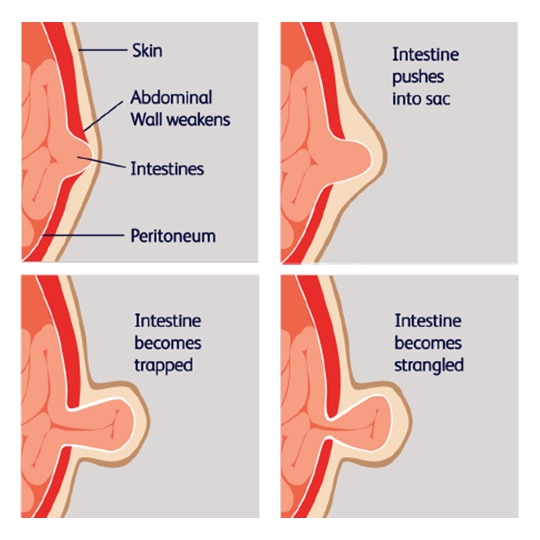- Pluta RM, Burke AE, Golub RM. Abdominal Hernia. JAMA.2011;305(20):2130. https://jamanetwork.com/journals/jama/fullarticle/900171
- Rather, Abdominal Hernias: Practice Essentials, Background, Anatomy. Medscape. March 16, 2023. https://www.medscape.com/answers/189563-45214/what-are-the-sex-related-demographics-for-abdominal-inguinal-hernias
- Symons, J. What is a Hernia? Types of Hernias & Risk Factors. Stamford Health. October 2, 2018. https://www.stamfordhealth.org/healthflash-blog/surgery/hernia-types-risk-factors/
- Sorenson, Hemmingsen, Kirkerby et al. Smoking is a Risk Factor for Incisional Hernia. JAMA. February 1, 2005.
- Kahrilas PJ, Kim HC, Pandolfino JC. Approaches to the diagnosis and grading of hiatal hernia. Best Practice & Research Clinical Gastroenterology. Volume 22, Issue 4, August 2008, pp 601–616.
- Hernia: What it is, Symptoms, Types, Causes & Treatment. Cleveland Clinic. February 7, 2023. https://my.clevelandclinic.org/health/diseases/15757-hernia
- Ventral (abdominal) hernia. Johns Hopkins Medicine. (2022, December 19). https://www.hopkinsmedicine.org/health/conditions-and-diseases/hernias/ventral-abdominal-hernia
- Mudge M, Hughes LE. Incisional hernia: A 10-year prospective study of incidence and attitudes. British Journal of Surgery. January 1985, Volume 72, Issue 1.
- Medical Encyclopedia: Inguinal hernia repair. MedlinePlus. November 09, 2016. https://medlineplus.gov/ency/article/007406.html
- Inguinal Hernia. Cleveland Clinic. April 26, 2022. https://my.clevelandclinic.org/health/diseases/16266-inguinal-hernia
- Ludwig, J. July 27, 2017. Strangulated hernia: Symptoms, treatment, outlook, and more. Healthline. https://www.healthline.com/health/strangulated-hernia#symptoms
- Congenital Diaphragmatic Hernia. Johns Hopkins Medicine. April 11, 2022. https://www.hopkinsmedicine.org/health/conditions-and-diseases/congenital-diaphragmatic-hernia
- Incisional Hernia. Johns Hopkins Medicine. December 19, 2022. https://www.hopkinsmedicine.org/health/conditions-and-diseases/hernias/incisional-hernia
This site is not intended as a substitute for professional medical care. Only your physician can diagnose and appropriately treat your symptoms. BD does not recommend the use of any particular physician or team of physicians. As with any surgery, hernia repair surgery carries certain risks. Talk to your doctor about possible complications of the surgery, as well as side effects. Please consult your healthcare provider for advice regarding who should be part of your hernia repair team.



